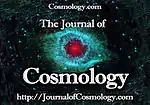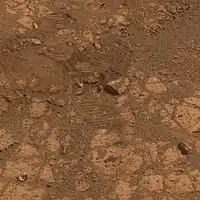Journal of Cosmology
The Journal of Cosmology describes itself as a peer-reviewed open access scientific journal of cosmology,[1] although the quality of the process has been questioned.[2][3][4][5][6][7] The journal has been closely related historically with a similar online website, Cosmology (or Cosmology.com)[8] and Journal of Astrobiology and Space Science Reviews.[9] The journal was established in 2009 and is published by Cosmology Science Publishers. Rudolph Schild is the editor-in-chief and executive editor.[1]
 | |
| Discipline | Cosmology |
|---|---|
| Language | English |
| Edited by | Rudolph Schild |
| Publication details | |
| History | 2009–present |
| Publisher | Cosmology Science Publishers (United States) |
| Standard abbreviations | |
| ISO 4 | J. Cosmol. |
| Indexing | |
| ISSN | 2159-063X |
| LCCN | 2010203854 |
| OCLC no. | 651009010 |
| Links | |
Scope
The Journal of Cosmology is an online publication website. The journal publishes original hypotheses and discoveries in cosmology, astronomy, astrobiology, and Earth and planetary sciences. Contributions may cover multiple disciplines and sub-disciplines of biology, geology, physics, chemistry, extinction, the origin and evolution of life, panspermia and Martian colonization and exploration.[1][10]
In general, published papers present original hypotheses, reviews, commentary, and speculation. Also covered is analysis of similarities and differences between competing hypotheses (Big Bang vs Steady State theory, panspermia vs abiogenesis, etc.).[1]
In June 2013, the journal launched a public invitation for theologians, theological ethicists and philosophers to contribute articles on "astro-theology".[11]
Reliability
The quality of peer review at the journal has been questioned.[2][3][4][5][6][7] It has been called a predatory journal[2] and a vanity press.[12] The journal promotes fringe viewpoints and speculative viewpoints on astrobiology, astrophysics, and quantum physics. Skeptical blogger and biologist PZ Myers said of the journal "... it isn't a real science journal at all, but is the... website of a small group... obsessed with the idea of Hoyle and Wickramasinghe that life originated in outer space and simply rained down on Earth."[4][13] The journal has responded that the paradigm "life on Earth came from Earth" is like a religious belief.[14]
History
Disputes with other scientists
Scientists who have posted accounts of personal attacks by the journal's staff members include Susan Blackmore,[15] David Brin,[16] and PZ Myers.[17]
Hoover paper
In early March 2011, the journal drew widespread controversy[4][18][19] for the publication of a paper by Richard B. Hoover[20] a retired NASA scientist, with claims of evidence in meteorites that life on Earth could have come from space, in this case debris carrying life from a comet to Earth. The journal dismissed the criticism as "a barrage of slanderous attacks" from "crackpots and charlatans", calling their own journal courageous for resisting the "terrorists" whose actions they equated with the Inquisition.[21][22] NASA distanced itself from Hoover's findings,[23] and issued a statement saying that the paper had been previously submitted in 2007 to International Journal of Astrobiology which did not accept it for review.[24] A number of commentaries on the paper were also published.[22]
In an open letter to the editors of Science and Nature, Rudolph Schild proposed to establish a commission to investigate the validity of the Hoover paper, which would be led by three experts appointed by Journal of Cosmology, Science and Nature.[25] Schild said he would interpret "any refusal to cooperate, no matter what the excuse" from Nature or Science as "vindication for the Journal of Cosmology and the Hoover paper, and an acknowledgment that the editorial policies of the Journal of Cosmology are beyond reproach".[25] They subsequently issued another statement in which they stood by their publication process and suggested that criticisms were "slander and histrionic tirades", and comparing their critics to "lunatics... unleashed to throw filth", suggesting that their own actions were part of a 2000-year struggle of science against religion. Since their critics had "refused to cooperate" in a review, they reaffirmed the study to be "beyond reproach".[26]

The James Randi Educational Foundation awarded Hoover the tongue-in-cheek Pigasus Award, for repeatedly announcing, "[a]long with the crackpot Journal of Cosmology",[27] widely dismissed claims that he had found signs of life in Mars rocks.[27][28]
NASA lawsuit
On 17 January 2014, NASA reported that a martian rock, named "Pinnacle Island", that was not in an Opportunity rover image taken on Sol 3528, "mysteriously" appeared 13 days later in a similar image taken on Sol 3540. One possible explanation, presented by Steven Squyres, principal investigator of the Mars Exploration Rover Mission, was that the rover, in one of its turning motions, flicked the rock from a few feet away and into the new location.[29][30] In response to the finding, Rhawn Joseph published an article in the Journal of Cosmology on 17 January 2014, concluding that the object is in fact a living organism resembling apothecia.[31] Rhawn Joseph then filed a writ of mandamus on 27 January 2014 in San Francisco Federal Court, demanding that NASA examine the rock more closely.[32][33][34] NASA already had examined the rock on 8 January 2014[35] and confirmed it was a rock with a high sulphur, manganese, and magnesium content.[36] According to Squyres, "We have looked at it with our microscope. It is clearly a rock."[34] On 14 February 2014, NASA released an image showing the location from where the "Pinnacle Island" rock was dislodged by the Opportunity rover.
Abstracting and indexing
The Journal of Cosmology is abstracted and indexed in Polymer Library and ProQuest databases. From 2009 until 2011 it was indexed in the Astrophysics Data System.
References
- "About the Journal". Journal of Cosmology. Retrieved 14 January 2012.
- Beall, Jeffrey. "Potential, possible, or probable predatory scholarly open-access journals". Scholarly Open Access. Archived from the original on 3 April 2013. Retrieved 9 April 2013.
- I. O'Neil (7 March 2011). "NASA Refutes Alien Discovery Claim". Discovery News. Retrieved 7 March 2011.
- P. Z. Myers (6 March 2011). "Did Scientists Discover Bacteria in Meteorites?". Pharyngula. Retrieved 6 March 2011.
- P. Plait (7 March 2011). "Followup Thoughts on the Meteorite Fossils Claims". Discover Magazine. Retrieved 6 March 2011.
- L. Battison (11 March 2011). "Microbes on a Moonbeam: Disentangling the Meteorite Microbe Claims". Science in Pen and Ink. Retrieved 12 March 2011.
- Martin, Mike. "'Alien Life' Claim Hampered by Journal's Dubious Reputation". Retrieved 18 July 2013.
- Staff (2017). "Cosmomolgy: About – History of Cosmology.com and the Journal". Cosmology.com. Retrieved 19 March 2017.
- Myers, PZ (25 March 2019). "Rhawn Joseph and a new silly claim about extraterrestrial life". Pharyngula.
- N. K. Geranios (15 November 2010). "Scientists propose one-way trips to Mars". MSNBC. Archived from the original on 4 January 2013. Retrieved 8 October 2011.
- Walker, Theodore, Jr. (30 June 2013). "Postmodern Astro-Theology, Cometary Panspermia, and the Polonnaruwa Meteorite : Astro-theology" (PDF). Journal of Cosmology. Retrieved 3 July 2013.
The Journal of Cosmology is now inviting theologians, theological ethicists, philosophers, and other scholars to offer commentaries and articles concerning recent factual evidence of extraterrestrial microbial life.
- Brown, Michael J. I. (3 August 2015). "Vanity and predatory academic publishers are corrupting the pursuit of knowledge". The Conversation. Retrieved 28 December 2020.
- P. Z. Myers (23 July 2009). "An Amusingly Suspicious "Paper"". Pharyngula. Archived from the original on 26 August 2011. Retrieved 6 March 2011.
- "Journal of Cosmology calls criticism of Hoover alien paper a witchhunt". Archived from the original on 27 August 2011.
- ""A note on the book 'Neurotheology' ", Susan Blackmore, April 2007, susanblackmore.co.uk". Archived from the original on 7 January 2015. Retrieved 7 January 2015.
- “An "explanation" for life's origins that falls way short”, David Brin, September 23, 2009, “Sentient Developments”
- “Professional science journalism”, PZ Myers, July 20, 2011, “Pharyngula”
- D. Dobbs (6 March 2011). "Aliens Riding Meteorites: Arsenic Redux or Something New?". Wired. Retrieved 6 March 2011.
- R. Redfield (6 March 2011). "Is this claim of bacteria in a meteorite any better than the 1996 one?". RRResearch. Retrieved 6 March 2011.
-
R. B. Hoover (5 March 2011). "Fossils of Cyanobacteria in CI1 Carbonaceous Meteorites". 13. Cite journal requires
|journal=(help) -
"The Controversy of the Hoover Meteorite Study: Official Statement The Journal of Cosmology, Have the Terrorists Won?". Journal of Cosmology. 8 March 2011.
- The statement was taken down, but a copy of the original can be found at D. Dobbs (10 March 2011). "Journal of Cosmology calls criticism of Hoover alien paper a witchhunt". David Dobbs's Somatic Marker. Archived from the original on 14 April 2013. Retrieved 22 September 2011.
- I. Musgrave (9 March 2011). "Commentaries posted at Journal of Cosmology". Astroblog. Retrieved 12 March 2011.
- "NASA shoots down alien fossil claims". ABC News. 8 March 2011. Retrieved 9 October 2011.
- Associated Press (7 March 2011). "Scientists skeptical of meteorite alien life claim". Chicago Sun-Times. Retrieved 9 October 2011.
-
R. Schild (11 March 2011). "The Journal of Cosmology Proposes a Scientific Commission, Established Co-Jointly with Science and Nature, To Investigate & Confirm the Validity of the Hoover Paper". Journal of Cosmology.
- A copy of the original can be found at G. Munevar (25 March 2011). "A New Controversy". Philosophy of Space Exploration. Retrieved 9 October 2011.
- D. Dobbs (18 March 2011). "Cosmology journal declares war won, enemies evil, new Galileo". Posterous. Retrieved 12 October 2011.
- S. Crabtree (1 April 2011). "The 5 Worst Promoters of Nonsense". James Randi Educational Foundation. Retrieved 9 October 2011.
- R. Mestel (1 April 2011). "Dr. Oz, Andrew Wakefield and others, um, 'honored' by James Randi". Los Angeles Times. Retrieved 2 April 2011.
- O'Neill, Ian (17 January 2014). "Mystery Rock 'Appears' in Front of Mars Rover". Space.com. Retrieved 18 January 2014.
- Chang, Kenneth (24 January 2014). "Mars Rover Marks an Unexpected Anniversary With a Mysterious Discovery". New York Times. Retrieved 24 January 2014.
- Joseph, Rhawn Gabriel (17 January 2014). "Apothecia on Mars? Life Discovered on the Red Planet". Journal of Cosmology. Retrieved 1 February 2014.
- Lecher, Colin (28 January 2014). "Lawsuit Alleges NASA Is Failing To Investigate Alien Life". Popular Science. Retrieved 31 January 2014.
- Weiss, Debra Cassens (29 January 2014). "Suit says NASA was 'recklessly negligent and bizarre' for failing to investigate Mars rock". American Bar Association. Retrieved 31 January 2014.
- Bailey, Lorraine (29 January 2014). "Is Mysterious Mars Rock a Fungus?". Courthouse News Service. Archived from the original on 1 February 2014. Retrieved 31 January 2014.
- OPPORTUNITY UPDATE: sols 3541–3547, 8 January 2014 – 15 January 2014.
- Staff (24 January 2014). "Scientist closer to solving Mars rock mystery, says NASA expert". The Telegraph. Retrieved 31 January 2014.
Further reading
- L. Battison (11 March 2011). "Microbes on a Moonbeam: Disentangling the Meteorite Microbe Claims". Science in Pen and Ink. Retrieved 12 March 2011.
- P. Plait (7 March 2011). "Followup thoughts on the meteorite fossils claim". Bad Astronomy. Discover. Retrieved 22 September 2011.